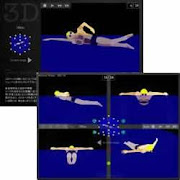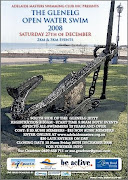 Courtesy of WOWSA, Huntington Beach, California.
Courtesy of WOWSA, Huntington Beach, California. As part of the Total Immersion 2010 Coaches Manual, founder and CEO Terry Laughlin advocates swimming to grow new brain cells rather than simply to grow new blood vessels. Instead of thinking about swimming from a physiological perspective, Total Immersion is advocating swimming for its neurological benefits.
Terry, who has developed a global following in over 30 countries while producing numerous multi-media teaching videos and books, aims to become the oldest and 36th member of the Triple Crown of Open Water Swimming in 2010 with a 24-mile Tampa Bay Marathon scheduled for April, a Catalina Channel swim scheduled for June and an English Channel two-way solo scheduled for August. The three planned swims from 2010 will add to his Manhattan Island Marathon Swims and his English Channel relay already under his belt. But his Triple Crown goal has become secondary to his more fundamental goal of growing new brain cells while training in both the pool and open water.
Terry explains here in his blog about what how brain cells function and grow while he swims – a benefit available to anyone. The enlightening and colorfully descriptive explanation is far different from the traditional perspective of thinking about swimming in purely physiological terms.
 John J. Ratey, MD, Clinical Associate Professor of Psychiatry at the Harvard Medical School and renowed author of Spark - The Revolutionary New Science of Exercise and the Brain, is a learned advocate of the relationship between exercise and the brain’s performance. In Spark, Dr. Ratey shows how even moderate exercise can supercharge mental circuits to beat stress, sharpen thinking and enhance memory.
John J. Ratey, MD, Clinical Associate Professor of Psychiatry at the Harvard Medical School and renowed author of Spark - The Revolutionary New Science of Exercise and the Brain, is a learned advocate of the relationship between exercise and the brain’s performance. In Spark, Dr. Ratey shows how even moderate exercise can supercharge mental circuits to beat stress, sharpen thinking and enhance memory. "We all know that exercise makes us feel better, but most of us have no idea why. We assume it's because we’re burning off stress or reducing muscle tension or boosting endorphins, and we leave it at that. But the real reason we feel so good when we get our blood pumping is that it makes the brain function at its best, and in my view, this benefit of physical activity is far more important—and fascinating—than what it does for the body. Building muscles and conditioning the heart and lungs are essentially side effects. I often tell my patients that the point of exercise is to build and condition the brain."
In a revelation after three decades of coaching and teaching tens of thousands of people around the world, Terry has developed an innovative methodology to strategically train for his Triple Crown goal with life-long benefits. As a result, he is now advocating swimmers to think about their own goals from a neural perspective first and foremost.
Copyright © 2009 by World Open Water Swimming Association




















No comments:
Post a Comment